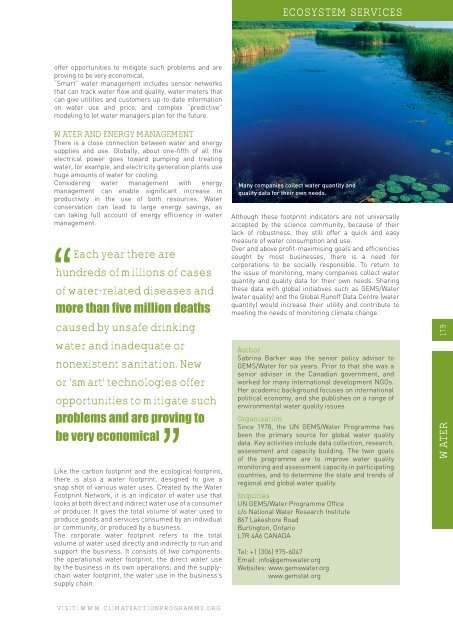Climate Action 2009-2010
Create successful ePaper yourself
Turn your PDF publications into a flip-book with our unique Google optimized e-Paper software.
ECOSYSTEM SERVICES<br />
offer opportunities to mitigate such problems and are<br />
proving to be very economical.<br />
“Smart” water management includes sensor networks<br />
that can track water flow and quality, water meters that<br />
can give utilities and customers up-to-date information<br />
on water use and price, and complex “predictive”<br />
modeling to let water managers plan for the future.<br />
WATER AND ENERGY MANAGEMENT<br />
There is a close connection between water and energy<br />
supplies and use. Globally, about one-fifth of all the<br />
electrical power goes toward pumping and treating<br />
water, for example, and electricity generation plants use<br />
huge amounts of water for cooling.<br />
Considering water management with energy<br />
management can enable significant increase in<br />
productivity in the use of both resources. Water<br />
conservation can lead to large energy savings, as<br />
can taking full account of energy efficiency in water<br />
management.<br />
“<br />
Each year there are<br />
hundreds of millions of cases<br />
of water-related diseases and<br />
more than five million deaths<br />
caused by unsafe drinking<br />
water and inadequate or<br />
nonexistent sanitation. New<br />
or ‘smart’ technologies offer<br />
opportunities to mitigate such<br />
problems and are proving to<br />
be very economical<br />
“<br />
Like the carbon footprint and the ecological footprint,<br />
there is also a water footprint, designed to give a<br />
snap shot of various water uses. Created by the Water<br />
Footprint Network, it is an indicator of water use that<br />
looks at both direct and indirect water use of a consumer<br />
or producer. It gives the total volume of water used to<br />
produce goods and services consumed by an individual<br />
or community, or produced by a business.<br />
The corporate water footprint refers to the total<br />
volume of water used directly and indirectly to run and<br />
support the business. It consists of two components:<br />
the operational water footprint, the direct water use<br />
by the business in its own operations; and the supplychain<br />
water footprint, the water use in the business’s<br />
supply chain.<br />
Many companies collect water quantity and<br />
quality data for their own needs.<br />
Although these footprint indicators are not universally<br />
accepted by the science community, because of their<br />
lack of robustness, they still offer a quick and easy<br />
measure of water consumption and use.<br />
Over and above profit-maximising goals and efficiencies<br />
sought by most businesses, there is a need for<br />
corporations to be socially responsible. To return to<br />
the issue of monitoring, many companies collect water<br />
quantity and quality data for their own needs. Sharing<br />
these data with global initiatives such as GEMS/Water<br />
(water quality) and the Global Runoff Data Centre (water<br />
quantity) would increase their utility and contribute to<br />
meeting the needs of monitoring climate change.<br />
Author<br />
Sabrina Barker was the senior policy advisor to<br />
GEMS/Water for six years. Prior to that she was a<br />
senior advisor in the Canadian government, and<br />
worked for many international development NGOs.<br />
Her academic background focuses on international<br />
political economy, and she publishes on a range of<br />
environmental water quality issues.<br />
Organisation<br />
Since 1978, the UN GEMS/Water Programme has<br />
been the primary source for global water quality<br />
data. Key activities include data collection, research,<br />
assessment and capacity building. The twin goals<br />
of the programme are to improve water quality<br />
monitoring and assessment capacity in participating<br />
countries, and to determine the state and trends of<br />
regional and global water quality.<br />
Enquiries<br />
UN GEMS/Water Programme Office<br />
c/o National Water Research Institute<br />
867 Lakeshore Road<br />
Burlington, Ontario<br />
L7R 4A6 CANADA<br />
Tel: +1 (306) 975-6047<br />
Email: info@gemswater.org<br />
Websites: www.gemswater.org<br />
www.gemstat.org<br />
WATER 179<br />
VISIT: WWW.CLIMATEACTIONPROGRAMME.ORG












